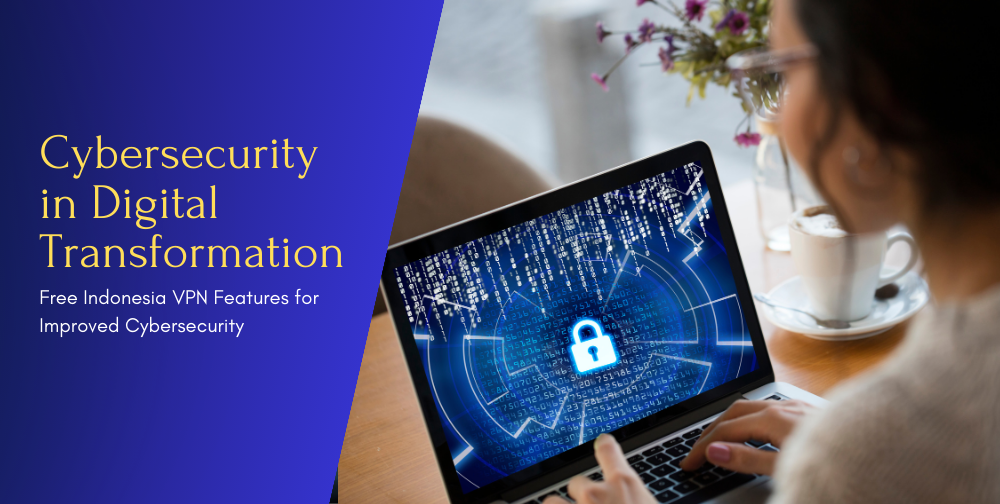Prioritizing Innovative Free Indonesia VPN Features for Improved Cybersecurity in the Digital Transformation Age

As the world embraces innovative approaches to conform with the digital age, organizations, governments, and individuals race to adopt and implement digital transformation initiatives, leading to technology advancing at an unprecedented pace; the need for robust internet privacy and security practices has become more critical than ever. With the increasing threat of cyber attacks, data breaches, and information theft, individuals and businesses must seek ways to enhance their online security.
One cybersecurity tool that has gained significant traction and popularity globally is the Virtual Private Network (VPN). However, since hackers and other malicious threat actors are constantly upping their game by deploying artificial intelligence (AI) and machine learning algorithms in cyberattacks, VPN service providers must integrate innovation to enhance better ways of encrypting data, AI-equipped threat detection, cascading internet traffic, and enabling post-quantum cryptography, among other features.
This article will explore the potential of utilizing the innovative free Indonesia VPN services to bolster cybersecurity in the digital transformation age.
Indonesia, known for its strong emphasis on technological advancements and innovation, has emerged as a strong player in the global digital landscape. With its high internet penetration rate and heavy reliance on digital solutions, the country has recognized the importance of cybersecurity in safeguarding its digital infrastructure.
As such, enabling free VPN services in Indonesia will be a veritable opportunity for individuals and businesses to strengthen their cybersecurity posture without incurring significant costs.
How a free Indonesia VPN works
An innovative free Indonesia VPN will further strengthen the secure and encrypted connection between the user’s device and the internet created by traditional VPNs. By routing the user’s internet traffic through a remote server, VPNs mask the users’ IP addresses and encrypt their online activities, providing a layer of anonymity, privacy, and security.
These innovative features make VPNs indispensable tools for individuals and organizations looking to protect their privacy and sensitive information from internet service providers (ISPs), hackers, and other third parties who may want to monitor and track users’ browsing activities.
In the context of Indonesia and maximizing the innovative features of a free VPN, leveraging the improved services can offer several advantages in bolstering cybersecurity practices. Firstly, it can address the growing concerns surrounding public Wi-Fi security with the following features.
1. Multi-hop, cascading, or double VPN
Public Wi-Fi networks, while convenient, are often susceptible to security vulnerabilities, making users vulnerable to potential cyber threats. An innovative free VPN with multi-hop, cascading, or double VPN technology routes your internet traffic through several servers in different locations, creating a complex web that throws off hackers from your track, making eavesdropping and monitoring almost impossible.
Leveraging this improved feature, individuals and organizations can encrypt their data transmission, mitigating the risks of using public Wi-Fi hotspots.
2. AI-powered threat detection
Another vital feature a free Indonesia VPN can offer is the AI-powered threat detection mechanism; hackers now deploy AI and machine learning algorithms to launch unprecedented cyberattacks, causing untold damage to individuals’ and organizations’ reputations. AI-powered threat detection feature, a paradigm shift in cybersecurity, analyzes patterns and behaviors in real-time, enabling swift and proactive identification and neutralization of potential cyber threats.
3. Enabling remote work access
With the hybrid nature of work now, there is a surge in remote work and cloud-based operations; securing sensitive business data and communications has become paramount. An innovative free VPN is a cost-effective measure for an individual or a business to establish secure, encrypted connections for remote employees, safeguarding critical business information from unauthorized access.
4. Geo-locational obfuscation
Geo-locational obfuscation is another innovative VPN technology organizations can leverage to access geo-restricted content and websites. An organization in Indonesia may need to access information from a source the authority considers offensive or illegal for seamless business processes; geo-locational obfuscation disguises your actual location and enables users to access region-restricted content effortlessly, empowering an organization or individual with unparalleled access to a globalized internet.
Individuals in the country can also leverage geo-locational obfuscation to stream and enjoy their favorite games and movies, accessing online content that may be otherwise unavailable in Indonesia.
5. Split tunneling 2.0
As an emerging industrial hub, free VPNs in Indonesia must integrate Split Tunneling 2.0, an innovative model of the traditional split tunneling feature in VPNs. The feature enables more precise control over their internet traffic for users by selectively choosing which applications or data packets should go through the encrypted VPN tunnel and which can access the internet directly, reducing bandwidth usage and enhancing seamless business processes.
Split Tunneling 2.0, an innovative feature of the VPN, takes customization to the next level; users can deploy the technology to selectively route sensitive traffic through the VPN encryption tunnel and allow nonsensitive traffic to bypass it. The fine-tuned control feature optimizes performance and enhances a better online experience.
Implementing free VPN services can add an extra layer of defense against cyber threats, helping businesses and individuals fortify their digital presence and protect against potential security breaches. However, while free VPN services offer undeniable advantages, it is critical to exercise caution and due diligence when selecting a provider.
Not all free VPNs prioritize non-log policy; some may engage in questionable data-handling practices, like selling users’ data for financial rewards. Therefore, users should thoroughly research and select reputable free VPN services with a track record of maintaining the world’s best cybersecurity practice standards.
Conclusion
As Indonesia continues in the race to ensure total digital transformation adoption, the role of free VPN services in enhancing cybersecurity is crucial. By leveraging the capabilities of free VPNs, individuals and businesses can fortify their online defenses, safeguard sensitive information, and navigate the digital landscape with greater peace of mind.
With digital adoption continuing to evolve, integrating innovative free VPN features is a proactive step toward enhancing cybersecurity in the digital transformation era.





